‘This is idiotic’: Holocaust survivors give evidence about proposed memorial
At a meeting of MPs on the Holocaust Memorial Bill select committee four survivors opposed to the project air their concerns alongside those of Baroness Deech and historian Sir Richard Evans
The first and oldest of four survivors to give oral evidence to the Holocaust Memorial Bill select committee has voiced her strong opposition to its proposals, at one point bringing her hand down on the desk to stress her point.
“This is a completely idiotic idea. It’s contrary to everything sensible and will not serve any purpose,” said Anita Lasker-Wallfisch, 98, the cellist who was part of the Women’s Orchestra of Auschwitz.
Asked on Wednesday whether she wanted to give her views on the idea of a learning centre being constructed in Victoria Tower Gardens, beside the Palace of Westminster, which is what the government is proposing, she replied, “Yes. In my opinion we are unlikely to learn now what we have not learnt in the last 80 years, especially –” she paused to emphasise the threat – “in the current climate of escalating antisemitism.”
She objected to the felling of trees that were hundreds of years old, and the serious risk of flooding and the overshadowing of the Butxon Memorial that she said would happen if the memorial was built.
Dr Martin Stern, a child survivor of the Westerbork and Theresienstadt camps, was the next to give evidence. While he admired the people behind the legislation and support for the UK’s Jews, he said implementation of their ideas was “disastrous”.
The learning centre the government intended to build beneath the memorial was “ridiculously small” for the purpose as well as too big for the site, he said. Furthermore, having spent 20 years himself teaching at the National Holocaust Centre in Nottinghamshire, Dr Stern felt that the current proposals lacked “serious, academic research into how such education is best put into practice”.
Along with previous witnesses, he said opting for a site such as the Imperial War Museum London, south of the river, would make the problems of visitors and security far easier to manage. A Holocaust centre in Westminster, intended to counteract antisemitism, would actually increase it, he feared. “People will say, ‘Look at the Jews, they push themselves to the front.’ I don’t want to create further ammunition for antisemites.”
When speaking with other survivors, Dr Stern said he found that they agreed with him but were being silenced. “Many of my Holocaust survivor friends believe the plan is wrong but are not willing to speak up against it because they feel they will antagonise important people in the field of Holocaust education and people whose friendship they need.”
Dr Lydia Tischler and Joanne Millan also gave evidence against the bill, with Millan referring to the design as a “toast rack”. She said the project should not be rushed: “Don’t hurry it through because I might die tomorrow.”
Earlier, Baroness Ruth Deech, the crossbench peer who had family members killed in the Holocaust and who has long campaigned against the current memorial proposals, said the Jewish community had not been consulted on them. She described the project as “political”, intended to send a message about British democracy, but one that would offer no protection against antisemitism.
She objected to various “tin-eared” aspects of the proposals, for example the fact that a memorial to children who had had no childhood might be located next to a children’s playground, and that a cafe “selling Coke and crisps” might be housed in a memorial to people who had starved to death.
Baroness Deech also reminded the MPs that the National Audit Office had raised concerns about the £138m project, the Infrastructure and Projects Authority had rated the memorial red (‘undeliverable’) and Unesco has rejected it and asked the government to think again.
Finally, she said the question of Israel was not being mentioned. “People don’t want to mention it but it’s important… If the British mandate had ended 10 years earlier, think how many hundreds of thousands if not millions would have been able to take refuge there. We cannot skate over that particular British aspect.”
The memorial, she concluded, was “toxic, and that’s not what a memorial should be”.
Later, Sir Richard Evans, the greatest living British historian on the period, said the proposals for a learning centre “would only be an embarrassment” for this country. It would be “smaller and less effective” than the Imperial War Museum’s Holocaust Galleries and only divert attention from them, he said.
The government is committed to seeing the bill become law, so that the project initiated by the UK Holocaust Memorial Foundation, set up by David Cameron in 2015, can be completed.
Christopher Katkowski KC, for the Department of Levelling Up, Housing and Communities, which is promoting the bill, challenged Baroness Deech and other witnesses but did not cross-examine the survivors. “I wouldn’t dream of asking a question,” he told the Conservative chair, John Stevenson, after Lasker-Wallfisch had finished her evidence. “I think I’ve well and truly met my match.”
The committee will continue its hearings next month, when the Thorney Island Society and residents of Westminster will give evidence.

Thank you for helping to make Jewish News the leading source of news and opinion for the UK Jewish community. Today we're asking for your invaluable help to continue putting our community first in everything we do.
For as little as £5 a month you can help sustain the vital work we do in celebrating and standing up for Jewish life in Britain.
Jewish News holds our community together and keeps us connected. Like a synagogue, it’s where people turn to feel part of something bigger. It also proudly shows the rest of Britain the vibrancy and rich culture of modern Jewish life.
You can make a quick and easy one-off or monthly contribution of £5, £10, £20 or any other sum you’re comfortable with.
100% of your donation will help us continue celebrating our community, in all its dynamic diversity...
Engaging
Being a community platform means so much more than producing a newspaper and website. One of our proudest roles is media partnering with our invaluable charities to amplify the outstanding work they do to help us all.
Celebrating
There’s no shortage of oys in the world but Jewish News takes every opportunity to celebrate the joys too, through projects like Night of Heroes, 40 Under 40 and other compelling countdowns that make the community kvell with pride.
Pioneering
In the first collaboration between media outlets from different faiths, Jewish News worked with British Muslim TV and Church Times to produce a list of young activists leading the way on interfaith understanding.
Campaigning
Royal Mail issued a stamp honouring Holocaust hero Sir Nicholas Winton after a Jewish News campaign attracted more than 100,000 backers. Jewish Newsalso produces special editions of the paper highlighting pressing issues including mental health and Holocaust remembrance.
Easy access
In an age when news is readily accessible, Jewish News provides high-quality content free online and offline, removing any financial barriers to connecting people.
Voice of our community to wider society
The Jewish News team regularly appears on TV, radio and on the pages of the national press to comment on stories about the Jewish community. Easy access to the paper on the streets of London also means Jewish News provides an invaluable window into the community for the country at large.
We hope you agree all this is worth preserving.
























